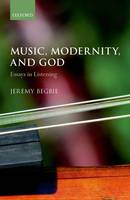 The director of Duke Initiatives in Theology and the Arts (DITA), Jeremy Begbie, has written a new book in the field of theology and the arts. Music, Modernity, and God will be available in the U.S. at the end of the month.
The director of Duke Initiatives in Theology and the Arts (DITA), Jeremy Begbie, has written a new book in the field of theology and the arts. Music, Modernity, and God will be available in the U.S. at the end of the month.
Aimed at students and scholars of theology and the arts, as well as musicologists, the book takes seriously the role of music in the story of modernity when told from a theological perspective.
Addressing some of the most intractable theological "problems" of the modern age through the lens of musical thought and experience, Begbie seeks to engage with respect and rigor the work of musicologists who have shown a willingness to explore specifically Christian dimensions of music with scholarly seriousness.
Music, Modernity, and God includes studies of Calvin, Luther, and Bach; an exposition of the intriguing tussle between Rousseau and the composer Rameau; and an account of the heady exaltation of music found in the early German Romantics. The book pays particular attention to the complex relations between music and language, and the ways in which theology, a discipline involving language at its heart, can come to terms with practices like music, which are coherent and meaningful but do not always operate in linguistic ways.
Structured to allow the reader to enjoy individual chapters as stand-alone essays, the book can also be read from cover to cover, either way providing benefit from the overlapping themes which run throughout the book.
Music, Modernity, and God is published by Oxford University Press.